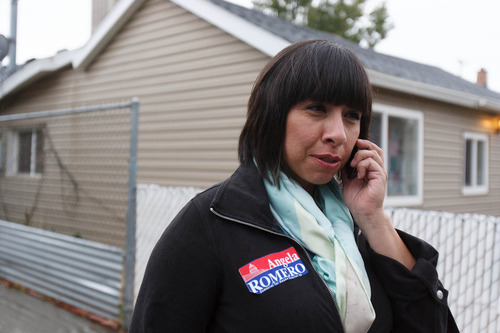This is an archived article that was published on sltrib.com in 2014, and information in the article may be outdated. It is provided only for personal research purposes and may not be reprinted.
Sexual assault is a problem — that much everyone seems to agree upon.
But how to bring justice and well-being to victims of rape is another question altogether.
At issue is the analysis, or lack thereof, of so-called "rape kits" — evidence gathered by specially trained nurses from reported rape victims.
Of 1,001 sex-assault investigations from 2003 to 2011, the Salt Lake City Police Department has shelved or destroyed 788 — nearly 79 percent — of rape kits, rather than forwarding them for processing at the state crime lab.
Police Chief Chris Burbank said that his investigators send the kits to the state lab when it's vital to bring criminal prosecutions, but not as a matter of course.
"Every one of these cases we bring to the [Salt Lake County] district attorney's office [for prosecution], we ask them what they need," he said Wednesday. "We don't have cases sitting around. Our detectives are very passionate about solving these cases."
The chief again explained his department's position on rape investigations on Wednesday's Trib Talk, the live-streamed news discussion at http://www.sltrib.com. He said a new website to debut next month will bring transparency to his department's investigations of sex assault by posting information about pending cases — whether rape kits were sent to the lab, the results and if the case was prosecuted. Victim identifying data will be removed.
Holly Mullen, executive director of the Rape Recovery Center, joined Wednesday's program, saying the police department ought to change its approach. "As an advocate, I say let's test every kit. It gives victims some assurance that their case is being worked on."
She also wondered aloud if the planned website would be helpful or further traumatize victims.
While the discussion seemed tense at times, it was markedly less so than a City Council work session last month, when Councilman Kyle LaMalfa asked the chief why so many rape kits had not been analyzed. The chief took umbrage at the suggestion his department was delinquent when investigating rapes.
Also joining Wednesday's Trib Talk, state Rep. Angela Romero, D-Salt Lake City, said she and other members of the Legislature had formed what she called a rape-kit work group "to look at the gaps in the system to make sure we don't have a backlog [of rape kits]."
The group will press for additional resources for the state crime lab, which is underfunded and understaffed. The legislative work group also seeks to build a victim-centric approach to rape investigations, she said.
"We need to make sure the victims have access to resources," Romero said. "It doesn't stop with sexual violence. It's about the mental-health issues involved in a sex crime."
Joining Burbank in a news conference last month, Salt Lake County District Attorney Sim Gill said he favored a multidisciplinary approach in which law enforcement, prosecutors, crime-lab analysts and advocates worked more closely to seek more convictions.
Burbank, Mullen and Romero all agreed that cooperation among various agencies would advance the challenge of dealing with sex assault. How that takes shape remains to be seen.



